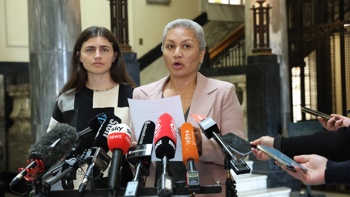The humanitarian crisis in Ukraine deepened Monday (local time) as Russian forces intensified their shelling and food, water, heat and medicine grew increasingly scarce, in what the country condemned as a medieval-style siege by Moscow to batter it into submission.
A third round of talks between the two sides ended with a top Ukrainian official saying there had been minor, unspecified progress toward establishing safe corridors that would allow civilians to escape the fighting. Russia's chief negotiator said he expects those corridors to start operating Tuesday.
But that remained to be seen, given the failure of previous attempts to lead civilians to safety amid the biggest ground war in Europe since World War II.
Putin's message to 'mothers, wives, brides'
Russian President Vladimir Putin has directly addressed the women linked to the soldiers that have been sent to invade Ukraine, telling them they should be proud of the troops.
In a video message released in the early hours of Tuesday morning, Mr Putin singled out the "mothers, wives, sisters, brides and girlfriends of our soldiers and officers".
"I know how worried you are for your loved ones. You can be proud of them, just as the whole country is proud and feels for them," he said.
Putin also stated that conscripts "will not be involved" in combat operations in Ukraine and that reserves would not be mobilised.
"The set goals will be achieved only by professional soldiers. I am confident that they will reliably ensure security and peace for the Russian people," he said.
'Fight to the death': Russia steps up attack
Ukrainian officials have claimed Russia is ramping up its attack of several major cities, including Kyiv.
Russian forces have reportedly launched hundreds of missiles and artillery attacks on residential areas of Chernihiv, north of Kyiv.
Mykolaiv is also being shelled, with Ukrainian presidential adviser Oleksiy Arestovich saying Ukrainian forces were also defending the port city of Odesa from invading ships.
Russian forces are still pushing their way forward to Kyiv, with soldiers and citizens alike setting up hundreds of checkpoints in a bid to protect the city.
"Every house, every street, every checkpoint, we will fight to the death if necessary," Mayor Vitali Klitschko said.
Zelenskyy: Russia mined medical supply roads
President Volodymyr Zelenskyy said instead of an agreement on humanitarian corridors, what Ukraine got on Monday was "Russian tanks, Russian Grad rockets, Russian mines."
"They even mined the roads that were the agreed routes for taking food and medicine to the people, to the children, of Mariupol," Zelenskyy said in what has become a daily video address close to midnight. On Monday night he spoke from behind the ornate desk in his official office, visual proof that he remains in Kyiv.
/cloudfront-ap-southeast-2.images.arcpublishing.com/nzme/MHLANW6HGBWNBJB2RSD5CQOKOY.jpg)
A woman holding a child cries after fleeing from the Ukraine and arriving at the border crossing in Medyka, Poland, Monday, March 7, 2022. Photo / AP
During talks on Monday, the Russians proposed evacuation routes leading to Russia and its ally Belarus, rather than to areas of western Ukraine that remain peaceful.
"It's just cynicism," Zelenskyy said. By opening a small corridor to Russia, he said, Moscow is looking only for a propaganda victory.
He said that on the 12th day of the war, the Ukrainian army is counter attacking and inflicting extremely painful losses on the enemy. "Battles are underway in the center, in the north and in the south of country – Mariupol and Kharkiv, Chernihiv and Sumy, Odesa and Kyiv, Mykolaiv and Zhytomyr."
Earlier updates continue below:
Well into the second week of the invasion, with Russian troops making significant advances in southern Ukraine but stalled in some other regions, a top US official said multiple countries were discussing whether to provide the warplanes that Ukrainian President Volodymyr Zelenskyy has been pleading for.
Russian President Vladimir Putin's forces continued to pummel cities with rockets, and fierce fighting raged in places.
In one of the most desperate cities, the encircled southern port of Mariupol, an estimated 200,000 people — nearly half the population of 430,000 — were hoping to flee, and Red Cross officials waited to hear when a corridor would be established.
/cloudfront-ap-southeast-2.images.arcpublishing.com/nzme/EQFLUKL7JGIGEUNRL2FZ6PW6H4.jpg)
A Ukrainian police officer runs while holding a child as the artillery echoes nearby, while fleeing Irpin on the outskirts of Kyiv, Ukraine. Photo / AP
The city is short on water, food and power, and cellphone networks are down. Stores have been looted as residents search for essential goods.
Police moved through the city, advising people to remain in shelters until they heard official messages broadcast over loudspeakers to evacuate.
Hospitals in Mariupol are facing severe shortages of antibiotics and painkillers, and doctors performed some emergency procedures without them.
The lack of phone service left anxious citizens approaching strangers to ask if they knew relatives living in other parts of the city and whether they were safe.
In the capital, Kyiv, soldiers and volunteers have built hundreds of checkpoints to protect the city of nearly 4 million, often using sandbags, stacked tires and spiked cables. Some barricades looked significant, with heavy concrete slabs and sandbags piled more than two stories high, while others appeared more haphazard, with hundreds of books used to weigh down stacks of tires.
"Every house, every street, every checkpoint, we will fight to the death if necessary," said Mayor Vitali Klitschko.
In Kharkiv, Ukraine's second-largest city, with 1.4 million people, heavy shelling slammed into apartment buildings.
"I think it struck the fourth floor under us," Dmitry Sedorenko said from his Kharkiv hospital bed. "Immediately, everything started burning and falling apart." When the floor collapsed beneath him, he crawled out through the third story, past the bodies of some of his neighbours.
Klitschko reported that fierce battles continued in the Kyiv region, notably around Bucha, Hostomel, Vorzel and Irpin.
In the Irpin area, which has been cut off from electricity, water and heat for three days, witnesses saw at least three tanks and said Russian soldiers were seizing houses and cars.
A few miles away, in the small town of Horenka, where shelling reduced one area to ashes and shards of glass, rescuers and residents picked through the ruins as chickens pecked around them.
"What are they doing?" rescue worker Vasyl Oksak asked of the Russian attackers. "There were two little kids and two elderly people living here. Come in and see what they have done."
In the south, Russian forces also continued their offensive in Mykolaiv, opening fire on the Black Sea shipbuilding centre of a half-million people, according to Ukraine's military. Rescuers said they were putting out fires caused by rocket attacks in residential areas.
At The Hague, Netherlands, Ukraine pleaded with the International Court of Justice to order a halt to Russia's invasion, saying Moscow is committing widespread war crimes.
Russia "is resorting to tactics reminiscent of medieval siege warfare, encircling cities, cutting off escape routes and pounding the civilian population with heavy ordnance", said Jonathan Gimblett, a member of Ukraine's legal team.
Russia snubbed the court proceedings, leaving its seats in the Great Hall of Justice empty.
Efforts to set up safe passage for civilians over the weekend fell apart amid continued Russian shelling. Before Monday's talks began, Russia announced a new plan, saying civilians would be allowed to leave Kyiv, Mariupol, Kharkiv and Sumy.
Later, Russia's UN Ambassador, Vassily Nebenzia, told the UN Security Council that Russia would carry out a cease-fire Tuesday morning and open humanitarian corridors leading away from Kyiv, Mariupol, Sumy and Chernigov.
Zelenskyy expressed skepticism about the sincerity of the gestures, asserting in his daily video address that instead of an agreement on humanitarian corridors, what Ukraine got on Monday was "Russian tanks, Russian Grad rockets, Russian mines".
Many of the evacuation routes headed toward Russia or its ally Belarus, which has served as a launch pad for the invasion. Ukraine instead proposed eight routes allowing civilians to travel to western regions of the country where there is no shelling.
/cloudfront-ap-southeast-2.images.arcpublishing.com/nzme/SZYM7TJQDGQHOF4HBWIU3V3C5I.jpg)
People cook outdoors for Ukrainian servicemen and civil defense members serving in Kyiv, Ukraine. Photo / AP
The UN humanitarian chief, Undersecretary-General Martin Griffiths, addressed the Security Council and urged safe passage for people to go "in the direction they choose".
The battle for Mariupol is crucial because its capture could allow Moscow to establish a land corridor to Crimea, which Russia seized from Ukraine in 2014.
The fighting has sent energy prices surging worldwide and stocks plummeting, and threatens the food supply and livelihoods of people around the globe who rely on crops farmed in the fertile Black Sea region.
The UN human rights office reported 406 confirmed civilian deaths but said the real number is much higher. The invasion has also sent 1.7 million people fleeing Ukraine.
On Monday, Moscow again announced a series of demands to stop the invasion, including that Ukraine recognise Crimea as part of Russia and recognise the eastern regions controlled by Moscow-supported separatist fighters as independent. It also insisted that Ukraine change its constitution to guarantee it won't join international bodies like Nato and the EU. Ukraine has already rejected those demands.
Ukraine President Volodymyr Zelensky has called for more punitive measures against Russia, including a global boycott of its oil exports, which are key to its economy.
"If [Russia] doesn't want to abide by civilised rules, then they shouldn't receive goods and services from civilisation," he said in a video address.
He has also asked for more warplanes. Deputy U.S. Secretary of State Wendy Sherman said officials are "trying to see whether this is possible and doable."
While the West has been rushing weapons to Ukraine such as anti-tank and anti-aircraft missiles, some officials fear that sending warplanes could be seen by Moscow as direct involvement in the war.
One possible scenario under discussion: Former Soviet bloc nations that are now Nato members could send Ukraine their own Soviet-era MiGs, which Ukrainian pilots are trained to fly, and the US would then replace those countries' aircraft with American-made F-16s.
Russia's invasion has nearby countries terrified the war could spread to them.
US Secretary of State Antony Blinken began a lightning visit to the Baltic states of Latvia, Lithuania and Estonia, former Soviet republics that are Nato members. Blinken hoped to reassure them of the alliance's protection.
Nato has shown no interest in sending troops into the country and has rejected Zelenskyy's pleas to establish a no-fly zone for fear of triggering a wider war.
- Additional reporting by nzherald.co.nz, news.com.au.
Take your Radio, Podcasts and Music with you









